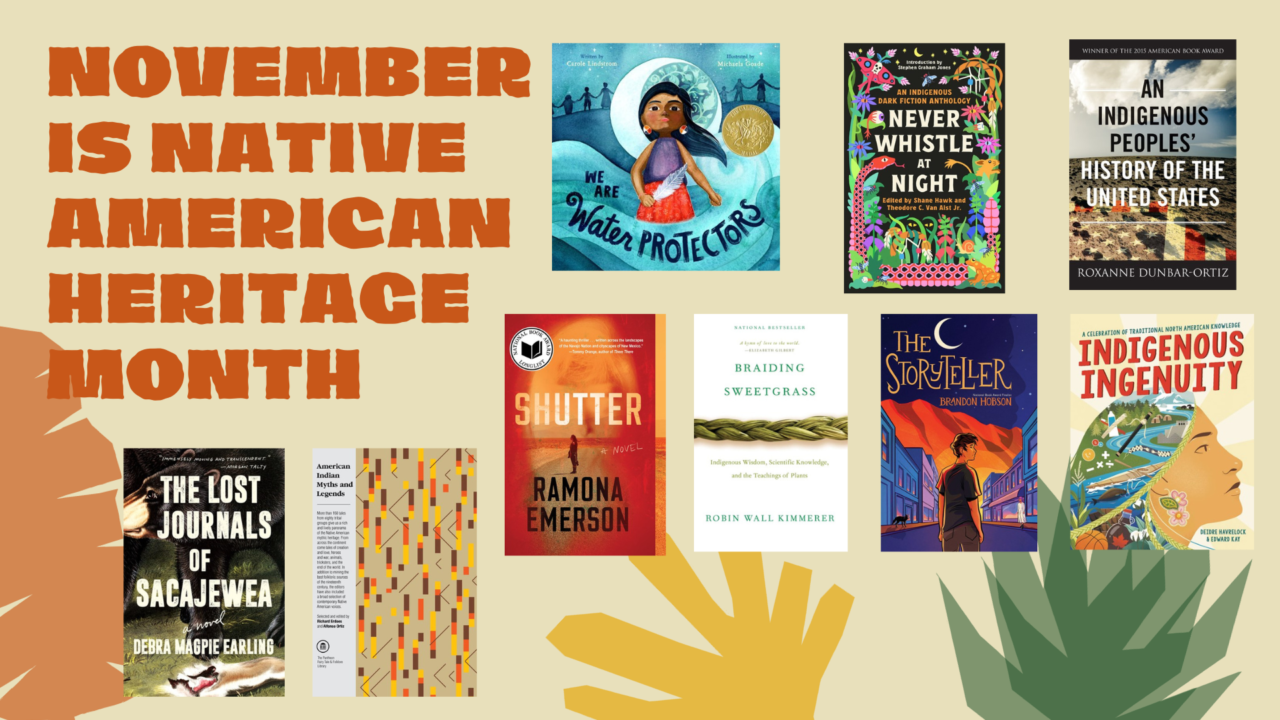
Native American Heritage Month celebrates the history, traditions, contributions, and living cultures of our nation’s indigenous peoples. Here are a few of the books we are reading and recommending. We have many more in store.
We Are Water Protectors by Carole Lindstrom, (Illustrated by Michaela Goade)
Inspired by the many Indigenous-led movements across North America, We Are Water Protectors issues an urgent rallying cry to safeguard the Earth’s water from harm and corruption—a bold and lyrical picture book written by Carole Lindstrom and vibrantly illustrated by Michaela Goade.
Never Whistle at Night by Shane Hawk & Theodore C. Van Alst, Jr. (Eds)
Many Indigenous people believe that one should never whistle at night. This belief takes many forms: for instance, Native Hawaiians believe it summons the Hukai’po, the spirits of ancient warriors, and Native Mexicans say it calls Lechuza, a witch that can transform into an owl. But what all these legends hold in common is the certainty that whistling at night can cause evil spirits to appear—and even follow you home.
These wholly original and shiver-inducing tales introduce readers to ghosts, curses, hauntings, monstrous creatures, complex family legacies, desperate deeds, and chilling acts of revenge. Introduced and contextualized by bestselling author Stephen Graham Jones, these stories are a celebration of Indigenous peoples’ survival and imagination, and a glorious reveling in all the things an ill-advised whistle might summon.
An Indigenous Peoples’ History of the United States by Roxanne Dunbar-Ortiz
Today in the United States, there are more than five hundred federally recognized Indigenous nations comprising nearly three million people, descendants of the fifteen million Native people who once inhabited this land. The centuries-long genocidal program of the US settler-colonial regimen has largely been omitted from history. Now, for the first time, acclaimed historian and activist Roxanne Dunbar-Ortizoffers a history of the United States told from the perspective of Indigenous peoples and reveals how Native Americans, for centuries, actively resisted expansion of the US empire.
Shutter by Ramona Emerson
This blood-chilling debut set in New Mexico’s Navajo Nation is equal parts gripping crime thriller, supernatural horror, and poignant portrayal of coming of age on the reservation.
Braiding Sweetgrass by Robin Wall Kimmerer
Drawing on her life as an indigenous scientist, and as a woman, Kimmerer shows how other living beings–asters and goldenrod, strawberries and squash, salamanders, algae, and sweetgrass–offer us gifts and lessons, even if we’ve forgotten how to hear their voices. In reflections that range from the creation of Turtle Island to the forces that threaten its flourishing today, she circles toward a central argument: that the awakening of ecological consciousness requires the acknowledgment and celebration of our reciprocal relationship with the rest of the living world. For only when we can hear the languages of other beings will we be capable of understanding the generosity of the earth, and learn to give our own gifts in return.
The Storyteller by Brandon Hobson
From National Book Award finalist Brandon Hobson, a kaleidoscopic middle-grade adventure that mixes the anxieties, friendships, and wonders of a Cherokee boy’s life with Cherokee history and lore.
Indigenous Ingenuity: A Celebration of Traditional North American Knowledge by Deidre Havrelock & Edward Kay
Corn. Chocolate. Fishing hooks. Boats that float. Insulated double-walled construction. Recorded history and folklore. Life-saving disinfectant. Forest fire management. Our lives would be unrecognizable without these, and countless other, scientific discoveries and technological inventions from Indigenous North Americans. Spanning topics from transportation to civil engineering, hunting technologies, astronomy, brain surgery, architecture, and agriculture, Indigenous Ingenuity is a wide-ranging STEM offering that answers the call for Indigenous nonfiction by reappropriating hidden history. The book includes fun, simple activities and experiments that kids can do to better understand and enjoy the principles used by Indigenous inventors. Readers of all ages are invited to celebrate traditional North American Indigenous innovation, and to embrace the mindset of reciprocity, environmental responsibility, and the interconnectedness of all life.
The Lost Journals of Sacajewea by Debra Magpie Earling
In this visionary novel, acclaimed Indigenous author Debra Magpie Earling brings this mythologized figure vividly to life, casting unsparing light on the men who brutalized her and recentering Sacajewea as the arbiter of her own history.
American Indian Myths and Legends by Richard Erdoes & Alfonso Ortiz
More than 160 tales from eighty tribal groups present a rich and lively panorama of the Native American mythic heritage. From across the continent comes tales of creation and love; heroes and war; animals, tricksters, and the end of the world.
